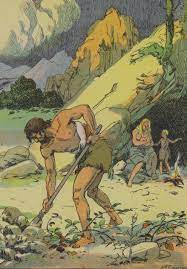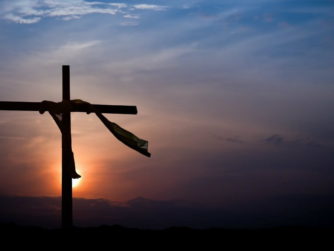Allegory on self-reliance and reliance on God.
The story of Adam and his role in the Garden of Eden offers profound insights into the beginning of humanity’s relationship with God, creation, and the consequences of disobedience.
In the beginning, God’s creation was complete and perfect, intended to thrive without human intervention. Genesis 2:5 reveals this divine arrangement, where the earth was sustained by a mist rising to water the ground. God had not designed for man to till the ground or plant in the field, thus there was no need for rain. This self-sustaining system was a testament to God’s perfect provision, where all creation existed in harmony, fully aligned with His purpose and reflecting His glory.
When God finally formed man, He placed him in the Garden of Eden, where everything had already been prepared. God had planted the garden Himself, and Adam was not required to till or cultivate the ground. His responsibility was merely to “dress” and “keep” the garden—terms that imply stewardship rather than the strenuous labour of tilling the soil. This divine provision meant that Adam was simply to enjoy the fruits of God’s work and take care of what had already been perfectly created. He was God’s ambassador on earth.
Within the Garden, God provided everything Adam needed; it was a place of abundance and life. Outside the Garden, however, there was no life, no plants grew, no rain fell, and no man to till the ground.
This stark contrast between God’s abundance in the garden and the barrenness outside emphasizes that life and provision are found within God’s divine arrangement. Everything outside God’s provision is desolate and lifeless.
After the Fall: Humanity’s Transformation and Consequences
Humanity’s role changed drastically after the fall. Adam and Eve’s pursuit of independence—wanting “to be like God, knowing good and evil“—led to their exile from Eden, creating both spiritual and physical separation from God. Adam, once in close communion with God, now experienced a spiritual distance, as God had forewarned.
Genesis 3:22-23 (ESV) illustrates this shift: “Then the Lord God said, ‘Behold, the man has become like one of us in knowing good and evil. Now, lest he reach out his hand and take also of the tree of life and eat, and live forever—’ therefore the Lord God sent him out from the garden of Eden to work the ground from which he was taken.”
With this separation, Adam was now required to toil and cultivate the cursed ground outside the garden before he could eat. The life of ease and divine provision in Eden was replaced with strenuous labour, symbolizing the struggle of human life apart from God’s direct sustenance.
Genesis 3:19 captures the weight of this new reality: “…till thou return unto the ground; for out of it wast thou taken: for dust thou art, and unto dust shalt thou return.”
This statement speaks to physical death and highlights humanity’s turn toward worldly pursuits. Adam, who once contained the breath of divine life, was now bound to the dust, drawn to material desires that could never substitute for the fullness of God’s presence. Material wealth that humans crave emerged from the ground, reflecting a detachment from their divine source of life.
While some view man’s assignment to “work the ground” as pure punishment, it also represents God’s release of man to his independent desires, fulfilling the consequence that “to dust you shall return.” God intended that this hardship would remind humanity of its need for Him. Yet, instead of seeking God, Adam and his descendants continued striving for self-sufficiency. Adam’s choice to labour over the cursed ground rather than seek God’s help illustrates humanity’s attempt to exercise dominion apart from the divine provision, showing no remorse or desire to rely on God’s sustenance.
Isaiah 45:9: “Woe unto him that striveth with his Maker! Let the potsherd strive with the potsherds of the earth. Shall the clay say to him that fashioneth it, What makest thou? or thy work, He hath no hands?” (KJV)
Woe to the person who strives with his maker! We need to surrender to His will.
This relentless striving underscores the lasting consequences of seeking life apart from God’s sustaining grace. Only in the providence of God will you find true satisfaction
Just as God asked Adam, “Where are you”? I ask you brother/sister, where is your heart located, in Jesus or outside Jesus (the world)? Come to Jesus today with a naked heart, not a heart to justify yourself and He will save you.
Have you lost your fellowship with God, return to Him now. He has not condemned you. Do not go in your way. Do not harden your heart. There is still room for you in your heavenly father’s house- even the prodigal son returned!
God’s Mercy and Protection from Eternal Damnation
In His mercy, God acted to prevent humanity from sealing its eternal fate.
Genesis 3:22-23 (ESV) states, “…Now, lest he reach out his hand and take also of the tree of life and eat, and live forever—therefore the Lord God sent him out from the garden of Eden to work the ground from which he was taken.”
After Adam and Eve’s disobedience, God’s decision to expel them from Eden wasn’t solely a punishment; it was also an act of mercy. Had Adam eaten from the Tree of Life in his sinful state which God knew was a possibility for Adam, he would have been doomed to eternal separation from God, trapped forever in his sinful nature. The devil’s plan, after leading Adam and Eve into disobedience, was to make man eternally damned, like himself. But God, in His mercy, intervened, preventing them from sealing their fate in this way.
To guard them from accessing the Tree of Life, God placed cherubim and a flaming sword at the entrance of Eden, keeping the way to this eternal life. This was to ensure that mankind (having the Adamic nature) wouldn’t eat from the Tree and live eternally in a fallen state—cut off from God’s redemption forever. Any individual seeking the life offered by the Tree of Life must first pass through this flaming sword, which represents the necessity of cutting away the Adamic nature.
This foreshadowing is fulfilled in Jesus Christ, who took the nature of Adam to the cross and eliminated it there. The Heavenly Father revealed to Him the path to the Tree of Life, as reflected in Psalm 16:11, which states, “You make known to me the path of life; in your presence, there is fullness of joy; at your right hand are pleasures forevermore.” Through His sacrifice, Christ provided the means for believers to reclaim eternal life, restoring access to the divine presence that was lost in Eden.
Jesus has made a way for you to enter into God’s presence to have access to His abundant life but you have to come in through that narrow way, letting that flaming sword (the cross) cut your adamic nature (pursuit, ambition, pleasure) by denying yourself, take up the cross of Jesus daily and follow Him

The Works of the Flesh and Spirit in the Next Generation: Cain and Abel
God’s curse on the ground was intended to reveal humanity’s helplessness and prompt a return to dependence on Him. Yet, Cain responded by presenting “the works of the flesh”—the produce of a cursed ground—as his offering to God. This gesture symbolized self-reliance, and God rejected both Cain and his offering. In contrast, Abel offered a burnt offering, symbolizing atonement for his sins, an act of worship that acknowledged God’s sovereignty and holiness. Abel’s sacrifice foreshadowed Christ’s ultimate offering, representing complete surrender, devotion, and submission of will to God.
God will not accept your offering if you are still walking in your own will and ways- an independent spirit.
Here is an excerpt on Burnt offering by Brother Zac Poonen The True Meaning of Burnt Offering | cfcindia, Bangalore:
This burnt offering is a picture of the way Jesus presented His body throughout His earthly life to His Father – and then finally on the cross as well. So when we look at Jesus’ life we don’t think only of His death at Calvary, but also of His whole life where He presented Himself to the Father fully saying, “A body Thou hast prepared for Me?..and I have come to do Thy will O God (in this body)” (Heb. 10:5,7). Jesus never once did His own will in his body but only the Father’s. This is what it means to offer oneself as a burnt offering to God. Paul exhorts us also to do so in Romans 12:1-2. “Present your bodies a living and holy sacrifice to God…that you may prove what the will of God is” – exactly as Jesus did. This burnt offering was presented to God and burnt completely. The Bible says this was “a soothing aroma to the Lord” (Lev 1:.17) – meaning something that God was very pleased with – “This is My beloved Son, in whom I am well-pleased.” Paul said that his life’s ambition too was to “please the Lord” (2 Cor. 5:9).
Cain’s offering, the fruit of self-reliant labour, reflects a life not surrendered to God (Romans 12:1-2), unable to discern “what is good, acceptable, and perfect” in God’s sight. Believing he was self-sufficient (as the serpent told him- “you will be like God” and “know what is good and evil”- meaning decide/judge what is good and evil by yourself) and already able to discern good and evil—” like God”—Cain missed God’s requirement for an offering of true surrender and repentance.
Friends, God desires your heart and life to be fully surrendered to Him before He values any offering you bring. Don’t be misled by those who may accept your financial gifts if your life isn’t aligned with His will—such offerings are not what God seeks. Remember, He is after genuine devotion, not just material offerings.
Copyright – Sunday Oladiran. No changes whatsoever are to be made to the content of the article without written permission from the author.





